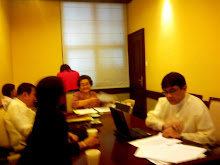
2010 looks ahead, like some train with coaches of prosperity and woe, delight and rue, promising and threatening. In my unguarded moments, that is how I am tempted to think of it. I'm sure others think of the coming year that same way.
But 2010 is a script to be written -- and only when the whole "play" is done and it too must do its exit. 2010 is what we make out of it within the circumstances that allow us to make a year. I do not subscribe to the popular belief that each can become what he wishes to be. After Foucault, we must be a little more circumspect.
It is not a blank page, because narrativity never takes off from a totally blank slate. My narrative has its context in the narrative of my family, my Tuguegarao community, and other interlocking circles of relations. "Promise" in reference to 2010 does not point to some hidden bag in which there might be pleasant surprises for me. "Promise" is the promise of possibility -- what I can make out of 2010, responding to the summons of the Spirit.
It has remained with me ever since I read the line in one book on fundamental theology that for Christianity, one key locus of revelation is human history itself. History is revelatory; the story of my life is revelatory, and if revelation is salvific, so then is history, with a power it cannot give itself. Salvation is not homogeneous to history. It always comes as 'gift'. My "thrownness" into 2010 is, in faith, the gift that a New Year is, and it is not principally the gift of a succession of days, but the promise of what I can bring to fruition about myself, ever encountering the Other.
Very recently, I discovered that some years ago, I was being considered by some bishops as Executive Secretary of the CBCP and then later on, as secretary to the Apostolic Nuncio. In both instances, I am told on good authority, he who, by every pastoral precept, should have put in a good word for me, blocked my elevation to these offices. During my first term as Vice-President for Academic Affairs of the Cagayan State University, he asked the University President not to appoint me. I was appointed, nevertheless. And even now, if he had a way, he would not want me as Vice-President of the Cagayan State University.
He knows that I am can rise to the challenges of office -- and so what is it that makes him take this posture towards me? I have not been the model of obedience, because his understanding of obedience is something I do not share. I cannot subscribe to his identifying the Church with his person. "When you obey me, you obey the Church". That, to me, borders on schism and heresy.
But my affection for him runs deep, thanks in large measure to my father who holds him in esteem. I also do, but I also hurt. I have risen to high office in civil life: Head of the Academic Affairs Office of the Philippine Judicial Academy of the Supreme Court, Vice-Dean of the Graduate School of the University of Santo Tomas, Dean of the Graduate School of Law of San Beda College, one of only two Filipino members of the International Criminal Bar, Research Fellow at the Institute of Philosophy of the University of Louvain, summer student at Cambridge -- I know what I am worth, and I will not put on "airs" of humility by being coy about this. Since I was needed under the present regime of the Archdiocese of Tuguegarao, I have endeavored to serve, as well as to find self-fulfillment where my capabilities were appreciated.
Should all this be remembered at the turn of the year? But of course, because they tell me how I must write, that the plot of my life has been convoluted, and many times, not of my own doing. And knowing that, I rejoice in the promise of 2010 and what I can do with it to write a chapter of my life in hues freed of bitterness (without being hypocritically oblivious) but seizing on the opportunities that present themselves. All the same I must struggle each day, in the exercise of the different responsibilities entrusted to me, to breathe the prayer: "I come to do your will".





